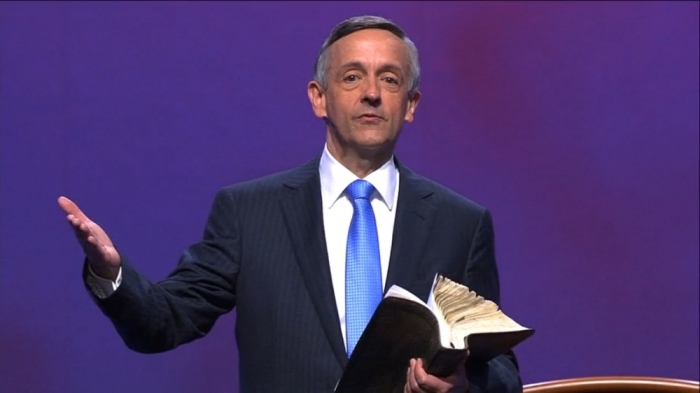Robert Jeffress: Why Is Gay Marriage Settled Law but Abortion Not?

Pastor Robert Jeffress thinks the U.S. Supreme Court can overturn legalized abortion, but cannot overturn same-sex "marriage."
Enthusiastic Trump supporter and pastor of First Baptist Dallas, Jeffress claimed last week that conservative Christians should give up the fight to overturn the Surpeme Court's redefinition of marriage in Obergefell v. Hodges.
"This is not going to be re-litigated by the Supreme Court. That is the law of the land," Jeffress told "Good Morning Texas."
To add insult to injury, Jeffress then accused those who think the gay marriage decision can and should be overturned of being extremists.
"Actually, I had to argue against some hard-right Catholics and evangelicals who wanted to make that a campaign issue," he added.
Overturning Obergefell is not the "hard right" position, it's the centrist position within conservatism and the Republican Party.
The Republican Party platform states,
"We condemn the Supreme Court's ruling in United States v. Windsor, which wrongly removed the ability of Congress to define marriage policy in federal law. We also condemn the Supreme Court's lawless ruling in Obergefell v. Hodges, which in the words of the late Justice Antonin Scalia, was a 'judicial Putsch' — full of 'silly extravagances' — that reduced "the disciplined legal reasoning of John Marshall and Joseph Storey to the mystical aphorisms of a fortune cookie." In Obergefell, five unelected lawyers robbed 320 million Americans of their legitimate constitutional authority to define marriage as the union of one man and one woman. The Court twisted the meaning of the Fourteenth Amendment beyond recognition. To echo Scalia, we dissent. We, therefore, support the appointment of justices and judges who respect the constitutional limits on their power and respect the authority of the states to decide such fundamental social questions."
And elsewhere states,
"Our laws and our government's regulations should recognize marriage as the union of one man and one woman and actively promote married family life as the basis of a stable and prosperous society. For that reason, as explained elsewhere in this platform, we do not accept the Supreme Court's redefinition of marriage and we urge its reversal, whether through judicial reconsideration or a constitutional amendment returning control over marriage to the states."
President-elect Donald Trump was supported by conservative Christians in large part due to his promise to appoint justices who would overturn Roe v. Wade, the decision that made abortion legal. Jeffress also made this argument, telling evangelicals to support Trump because life and religious liberty issues will be decided by a future Supreme Court.

During the campaign, Trump's language was more equivocal on marriage than abortion. Trump said he would appoint justices that "could" (rather than "would") overturn gay marriage.
In January, when asked if he would appoint judges that would overturn Obergefell, he answered, "If I'm elected I would be very strong in putting certain judges on the bench that maybe could change things, but they have a long way to go."
And in a February interview with the Christian Broadcasting Network, Trump said "I think [evangelicals] can trust me. They can trust me on traditional marriage. I was very much in favor of having the court rule that it goes to states and let the states decide."
But he changed his position after winning the election, claiming that gay marriage is now "settled law."
To argue the redefinition of marriage is settled law, but legal abortion is not settled law is a nonsensical contradiction.
A judicial philosophy that would lead a justice to overturn Roe should also lead them to overturn Obergefell, because both of those decisions have similar flawed reasoning.
Trump shouldn't argue that he'll pick justices based upon how they will rule on particular cases. Potential nominees should not pre-decide cases they have not heard. And if they do, they shouldn't be a judge. Judges should examine the evidence of the individual cases before them, then decide after thoughtful deliberation. So before the election Trump was correct on marriage and incorrect on abortion to use uncertain language like "maybe" and "could."
Instead of choosing nominees based upon how they would decide future cases, Trump should choose judicial nominees who demonstrate a philosophy of judicial restraint and an adherence to the language and intent of the law.
It was a liberal judicial philosophy, which treats the Supreme Court like a super legislature and the Constitution like silly putty to impose their personal preferences on the nation, that brought about both the legalization of abortion and the redefinition of marriage to include same-sex couples.
So, if Trump does appoint conservatives to the Supreme Court, as he promised, that could (and should), given the right cases, eventually lead to the overturning of both Roe and Obergefell.
During the election, Jeffress said evangelical Trump critics were "weak," "namby-pamby," "fools" and "motivated by pride."
But Jeffress' willingness to to surrender on the marriage issue, in defense of Donald Trump, demonstrates one of the main concerns of the "never Trump" evangelicals — that Trump will influence evangelicals more than evangelicals influence Trump.




























